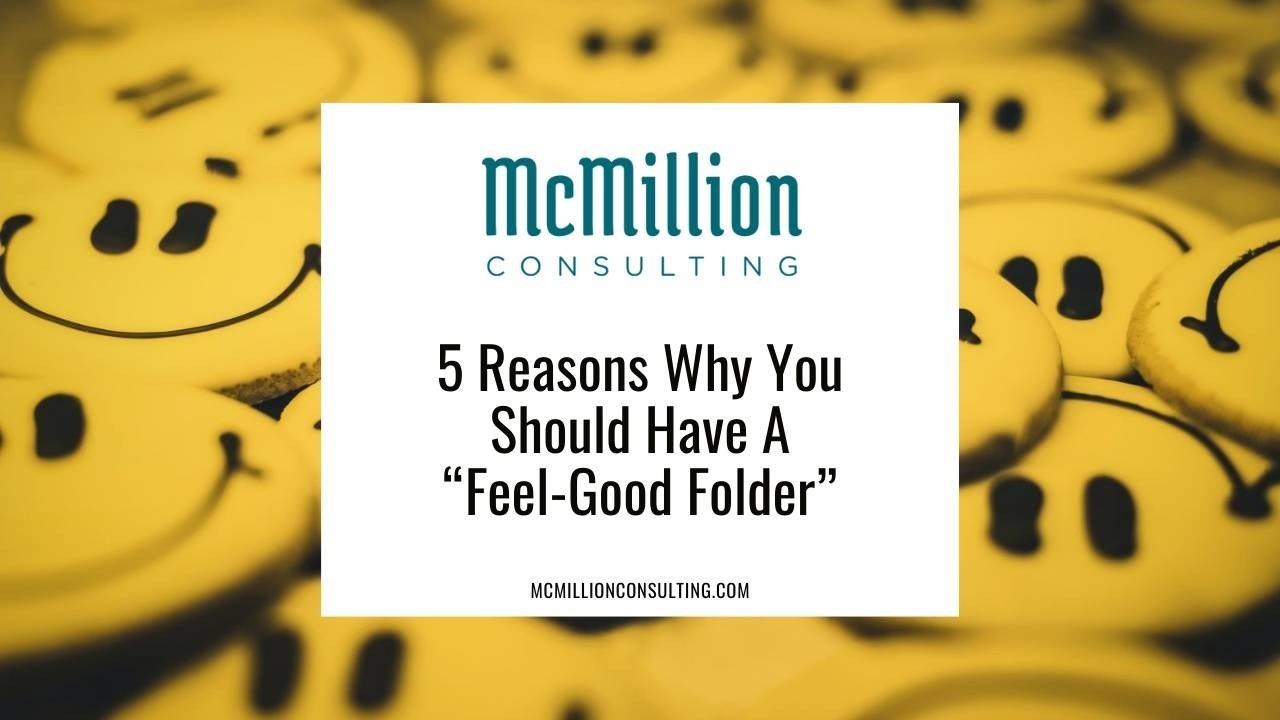5 Reasons Why You Should Have A “Feel-Good Folder”
May 07, 2022
We’ve all had a bad day, a moment of insecurity, or a sales conversation that didn’t go as planned. It’s tough, sometimes, to gain perspective when you’re down in the dumps about who you are or what you do. Enter what I like to call the “feel-good” folder. The idea of a feel-good folder is simple—it’s simply a repository of kind words from friends, colleagues, and clients that made your day.
Your feel-good folder could be an actual folder full of printed emails, cards, and letters, or a folder in your email inbox. Alternatively, it might not be a folder at all. Instead, it could be a photo album on your phone where you save screenshots of emails and texts that mean a lot to you. You could even use LinkedIn’s built-in feel-good folder of sorts—the recommendations section of your profile. I even use audio testimonials, where former clients share short recordings about their experiences working with me and my team. So, your feel-good folder could also be a list of recordings you save on the voice memo app on your phone.
Whatever form it takes, filing away encouragement in your feel-good folder is a great way to invest in yourself and stay focused on what matters. The benefits of a feel-good folder are more far-reaching than you might expect, so if you don’t already have one started, here are the top five reasons you should consider making one.
1. It boosts confidence in low moments.
Even the most capable and confident people I know have rainy days from time to time. Whether you’re just in a funk or battling full-on imposter syndrome, returning to your wins and moments of praise can provide a helpful perspective. In the midst of the storm, it can be hard to remember the sunny days, but storing your brightest moments in a folder makes them easy to find when you need them.
2. It affirms your growth.
If you’ve made a conscious effort to grow in one area or another, receiving a related compliment can help you appreciate how far you’ve come. In a half-day onsite workshop with a client in Michigan, an attendee came up to me afterward and commented that he was impressed that I had already learned everyone’s names. (There were more than 25 people in the training.) Making people feel known and seen in my training sessions is something I make a conscious effort to do, so it was especially meaningful to hear that I had accomplished that. Another participant from the same workshop provided a written review later, and you can bet that note went straight into the feel-good folder.
3. It timestamps your business milestones.
Whether you file your words of encouragement away in a true folder, a phone photo album, or your LinkedIn recommendations section, they can serve as a sort of timeline for your business. For example, I can chronicle the years in terms of speaking engagements, clients, or training events simply by scrolling through the notes I’ve received over the years. We often get so busy moving forward that we forget to appreciate past successes, so your folder can help ensure you don’t lose sight of important moments.
4. It provides insight into how your customers and colleagues perceive you.
It’s easy to hope, but not know, that your clients and peers think highly of you. The best compliments are often the ones you never ask for, but even when you do request feedback, it often exceeds expectations. As part of The Profile Transformer™️ process, I encourage my clients to solicit testimonials. It’s always so fun to see what they receive in response. Often, they’re blown away to hear the kind things their clients have to say about them. These comments can help you identify your strengths and communicate them clearly.
5. It can help you establish your credibility.
Another benefit of creating a feel-good folder is that, with permission from your clients and colleagues, it can help you establish credibility. This is particularly true when your version of a feel-good folder is the recommendations section of your LinkedIn profile. Because LinkedIn recommendations provide transparency about the recommender and cannot be edited by the recipient, they are an especially powerful form of feedback. In fact, after working with me for The Profile Transformer™, a former client took my advice to solicit client feedback to heart and has since received more than 20 recommendations on LinkedIn. Now, his transformed LinkedIn profile and client recommendations work together to showcase his competence and credibility.
PS - If you’re not sure how or why to utilize your LinkedIn recommendation section, read all about it in this LinkedInsider article.
The awesome thing about a feel-good folder is that it takes little effort to create over time and it’s ready for you whenever you need it. Even on a great day, you can check in with your folder to remember why you do what you do and who you can impact through your work. There’s nothing like the kindness of others to help us remember our sense of purpose.
Looking for more ways to make an impact? Engaging on LinkedIn is an ideal way to reach a new audience and share your expertise. If you’ve never really posted on LinkedIn before or you’re not sure how, my Put a Ring on It Challenge is a great way to start engaging on LinkedIn the right way. In this five-day mini-training, you’ll learn how and when to post on LinkedIn, engagement best practices to enhance your visibility, as well as the art of the follow-up and lead generation. Get started or learn more on our website.



